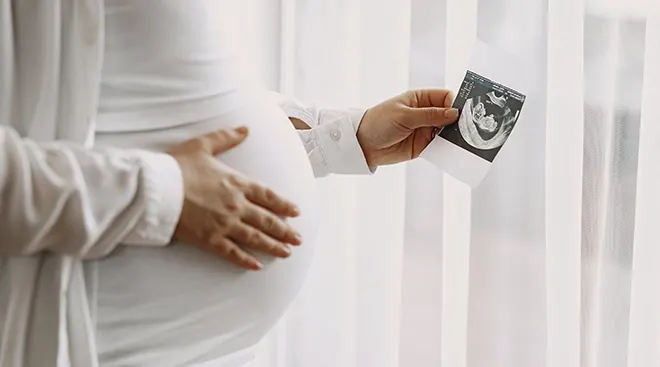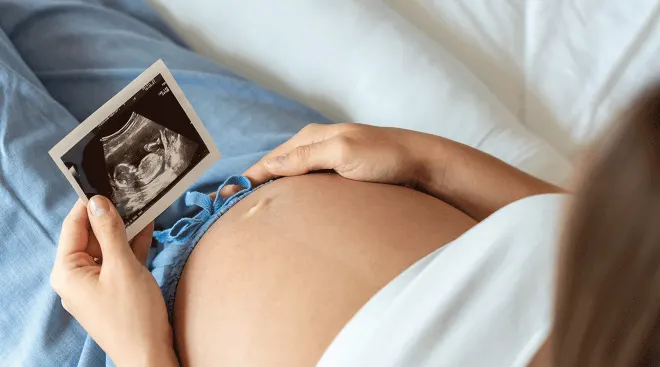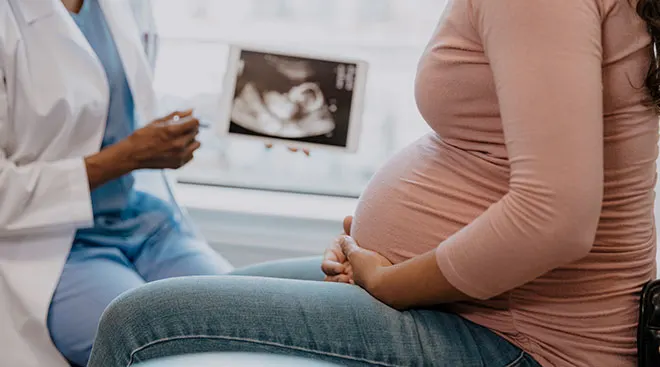Stages of Pregnancy: When Does Each Trimester Start and End?
Wondering exactly what each trimester of pregnancy will bring? While there’s a general timeline of events to expect, a lot of your experience will be subjective. “Pregnancy isn’t an exact science,” says Rebekah Mustaleski, CPM, a certified professional midwife and compression director at Motif Medical. “There are estimates and ranges that are averages for when things happen for most people, but each pregnancy is different.”
So how long are the three trimesters of pregnancy? What happens during each—and what can you expect on this wild journey to parenthood? Here’s what to know about the different stages of pregnancy, including trimester length, pregnancy symptoms, fetal development and more.
There are three trimesters of pregnancy, which total 40 weeks of gestation. That said, some pregnancies won’t make it to the 40-week finish line, while others will stretch on for up to 42 weeks. (Most health care providers will induce labor after this time frame to keep mom and baby safe.) How long a pregnancy lasts will vary from person to person based on factors like age, weight, personal medical history and how many babies they’re expecting.
What’s more, due dates aren’t concrete and can change during your pregnancy. They’re usually calculated using the first day of your last menstrual period, and based on a 28-day menstrual cycle that assumes you ovulate on day 14—which isn’t always the case. “There’s quite a bit of variation as to when someone ovulates during their cycle,” explains Mustaleski. “These calculations give an estimated due date, in part because very few people give birth on their due date, but also because [determining] when you conceive is an estimate with this method.” Depending on how long your cycle actually is, your due date may change after your ob-gyn performs the first trimester ultrasound and gets a better grasp on how things are progressing.
According to Stephanie Hack, MD, ob-gyn and host of the Lady Parts Doctor podcast, you might get a slightly different answer depending on who you ask. However, she says that the first trimester is generally accepted as the first 13 weeks of pregnancy. “It includes the time before conception when the soon-to-be fertilized egg is prepared for ovulation, and ends on the last day of the thirteen weeks (13 weeks and 6 days),” Hack says. (This is also how the American College of Obstetricians and Gynecologists (ACOG) defines the first trimester.)
How baby develops during the first stage of pregnancy
The first trimester of pregnancy is a period of rapid development for baby. “It’s when all of the cells are differentiating into the various parts, organs and systems of the body,” Mustaleski explains. During this time, baby will start to develop major organs, such as the lungs, brain, liver, kidneys, pancreas and cardiac tissue, as well as the spine and genitalia, notes the ACOG. Additionally, the eyes, eyelids, nose, mouth, ears, webbed fingers and toes, fingernails and cartilage for their limbs begin to form. By the end of week 12, baby has a facial profile, and their movements can be seen on an ultrasound, says Hack.
How you’ll feel during the first trimester of pregnancy
It’s safe to say that the first trimester of pregnancy brings several changes to the body. The most infamous early symptom is morning sickness, which is the result of the increased hormone levels (like hCG) required to maintain a healthy pregnancy. Nausea peaks around 10 to 12 weeks, which is also when levels of hCG are highest, says Mustaleski. While morning sickness generally subsides during the second trimester, some women may experience more severe levels of nausea and vomiting due to hyperemesis gravidarum, which can last throughout the entire pregnancy.
Other common first trimester symptoms include:
- Breast tenderness and darkened areolas; these are a result of boosted levels of estrogen and progesterone
- An increase in discharge, known as leukorrhea
- The frequent urge to pee, as your uterus starts to grow and press on your bladder,
- Constipation, uncomfortable gas and heartburn—these unpleasantries occur as progesterone slows down muscular contractions in the intestines, notes Johns Hopkins Medicine
- Veins that become more noticeable, due to increased blood volume
- Mood swings
Of course, all of this is underscored by the intense fatigue that accompanies the first trimester.
Wondering how long these first trimester symptoms will last? Unfortunately, there’s no definitive answer, and it can vary from person to person. “Some people find their first trimester symptoms start to fade around 11 weeks, and others have them persist until weeks 15 or 16,” Mustaleski says. Moreover, while some women may experience certain symptoms—like sore breasts and constipation—for a short period of time, others will experience them on and off throughout their entire pregnancy.
Prenatal care during the first trimester of pregnancy
In an uncomplicated pregnancy, you’ll probably see your ob-gyn or midwife once a month through the first and second trimesters, Johns Hopkins Medicine notes. During those early prenatal visits, your provider will want to get familiar with your personal and family medical history. You can expect pelvic exams, ultrasounds, urine tests, blood tests and genetic testing, such as non-invasive prenatal testing. The purpose of all these screenings? To ensure your health and assess baby’s growth. “Most babies develop at the same rate during the first trimester. Ultrasounds can measure the size of baby to make sure they’re growing as expected for their week of pregnancy,” explains Mustaleski. Most providers will also pay close attention to fetal heart rate throughout pregnancy, as it’s a big indicator of baby’s health and well-being, she adds.
The second trimester of pregnancy starts at 14 weeks and runs through 27 weeks and 6 days, says Hack.
How baby develops during the second stage of pregnancy
During the second trimester of pregnancy, baby will continue to grow in size and weight. According to the ACOG, here’s what you can expect during the second trimester:
- Baby can move, kick (around 20 weeks) and respond to certain stimulation
- Baby can hear your voice in the womb, thanks to developed ears and hearing
- Reflexes, including sucking and swallowing, are beginning to develop
- Fingernails, toenails and fingerprints are developing
- Baby will grow a layer of protective hair on their skin called lanugo
- Baby will have a working digestive system
At this point, the placenta—which nourishes baby in-utero—will also be fully developed.
How you’ll feel during the second trimester of pregnancy
The second trimester is often said to be the most enjoyable stage of pregnancy, as there are less dramatic hormonal changes. Moreover, morning sickness, fatigue and breast soreness usually ease up, thanks to decreased hCG levels, according to Johns Hopkins Medicine. You may even begin to have an increased appetite! “The first trimester is the body getting used to being pregnant, and the third trimester is the body getting ready for birth,” Mustaleski explains, adding that the second trimester can be more fun; you get to feel baby moving around, but you haven’t yet reached the point where pregnancy can feel uncomfortable.
During this trimester of pregnancy, your pregnant belly will start showing (around 20 weeks), and you may experience increased back pain as a result of the added weight. Plus, as your belly skin stretches, you might also start to experience itchy skin and stretch marks.
Another annoying, but common symptom of the second stage of pregnancy? Nosebleeds—these occur as a result of an increase in hormones and boosted blood volume. Finally, some symptoms—like frequent urination, heartburn and constipation—will likely carry over from the first trimester.
Prenatal care during the second trimester of pregnancy
At prenatal visits, you can expect your ob-gyn to keep an eye on your weight, the size of your uterus, baby’s growth and their heartbeat. “By the end of the second trimester, baby’s heart rate should accelerate when they move around,” Mustaleski says. Plus, doctors will also monitor your urine and blood pressure at every appointment starting around 20 weeks to track any signs of preeclampsia. You’ll also have an ultrasound around the 20-week mark that can reveal baby’s sex, if you haven’t yet found out, and want to know it.
The third trimester of pregnancy starts at 28 weeks, and continues until baby’s big arrival. Most babies are born between 37 and 42 weeks, says Mustaleski.
Wondering what actually counts as a full-term birth? According to the ACOG, it’s a birth that occurs between 39 and 40 weeks and 6 days. Anything before that is classified as preterm (up to the 37-week mark) or early-term (37 weeks through 38 weeks, 6 days), while anything after is considered a late-term.
How baby develops during the third stage of pregnancy
Fetal development during the third trimester of pregnancy includes some exciting milestones. During this stage of pregnancy, baby will:
- Start to have coordinated reflexes
- Begin to sense changes in light
- Lose their lanugo (around 31 weeks)
- Have largely functional immune and circulatory systems (by 36 weeks), as well as some mature organs (these continue to develop until birth)
- Form meconium around 37 weeks (this will become baby’s first poop)
While baby’s bones will continue to harden, those of the skull will remain soft to help them pass through the birth canal, notes Johns Hopkins Medicine.
How you’ll feel during the third trimester of pregnancy
Wondering how you might feel during this last stage of pregnancy? By this point, you’ll probably be tired and a bit uncomfortable, thanks to your growing bump and shifting organs. You may also experience:
- Back pain and leg cramps
- Swelling in your feet, hands and face
- Shortness of breath
- Continued heartburn and frequent urination
- Spider and varicose veins, as well as hemorrhoids
During the third trimester of pregnancy, you may start to experience Braxton Hicks contractions. These can happen at anytime, but are often more noticable as your pregnancy progresses. It can be confusing to differentiate them from real labor contractions, so keep in mind that they’re often triggered by things like dehydration, urinary tract infections and sex during pregnancy. (When in doubt, monitor your body to make sure contractions aren’t getting more intense and closer together—a potential sign of labor.)
Toward the end of the third trimester, you may lose your mucus plug and feel baby drop, which essentially means they’ve moved further into the pelvis. Closer to 36 weeks, they’ll likely rotate into a head-down position in preparation for birth.
Prenatal care during the third trimester of pregnancy
In the final trimester of pregnancy, prenatal visits will become a more frequent affair, and your ob-gyn or midwife will probably want to see you every two weeks (or even weekly in your final month). Ultimately, this will depend on your provider, your individual pregnancy and your personal medical history. During these visits, your doctor will want to hear about any discomforts, as well as check your weight and blood pressure for signs of preeclampsia. Of course, your care team will also continue to monitor baby’s fetal growth and heartbeat.
Between 24 and 28 weeks, you’ll be screened for gestational diabetes. Depending on your results, your doctor may ask you to take a second, more comprehensive glucose test. “If your body is struggling to balance blood sugar levels, that’s something we want to help with as soon as possible,” Mustaleski explains, as “having blood sugar spikes and drops isn’t healthy for you or baby.”
Around 36 weeks, your ob-gyn may also start checking for effacement and cervical dilation, says Mustaleski, adding that some providers may not check at all before labor begins.
As you move through the last stages of pregnancy, be sure to ask any and all questions you have about contractions and labor, and discuss your birth plan and any concerns or fears. Additionally, don’t forget to prepare for the postpartum period, also referred to as the fourth trimester. Consider writing up a postpartum plan, and discuss it with your partner and doctor before baby’s arrival. The more support you have during those first few weeks with baby, the better set up for success you’ll be. “This is a time to rest and nourish your body,” says Mustaleski. “Your body is amazing and deserves a little TLC to rebuild and restore itself to its new normal.”
Learning what to expect in the three trimesters of pregnancy can be overwhelming; just take it one roller-coaster day at a time. Hang in there, and enjoy the beautiful journey ahead.
Please note: The Bump and the materials and information it contains are not intended to, and do not constitute, medical or other health advice or diagnosis and should not be used as such. You should always consult with a qualified physician or health professional about your specific circumstances.
Plus, more from The Bump:
Stephanie Hack, MD, MPH, is board certified ob-gyn and host of the Lady Parts Doctor podcast. She obtained her medical degree from Lewis Katz School of Medicine at Temple University, as well as a masters degree in public health. She completed her residency at Georgetown University Hospital and Washington Hospital Center.
Rebekah Mustaleski, CPM-TN, IBCLC, is a certified professional midwife specializing in evidence-based maternity care. She co-founded Roots & Wings Midwifery in Knoxville, Tennessee. Mustaleski received her bachelor’s degree in psychology from Centre College and worked as a doula and birth photographer prior to establishing Roots & Wings.
The American College of Obstetricians and Gynecologists, How Your Fetus Grows During Pregnancy, 2023
Johns Hopkins Medicine, The First Trimester, 2023
The American College of Obstetricians and Gynecologists, Definition of Term Pregnancy, 2022
Johns Hopkins Medicine, The Third Trimester, 2023
Learn how we ensure the accuracy of our content through our editorial and medical review process.
Navigate forward to interact with the calendar and select a date. Press the question mark key to get the keyboard shortcuts for changing dates.





















































